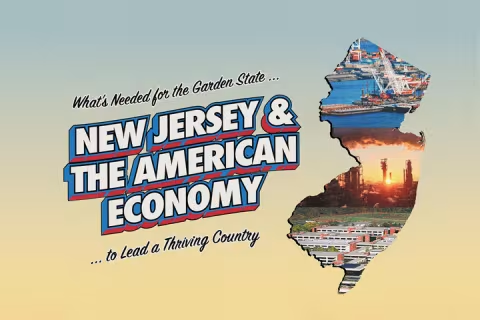
The Princeton School of Public and International Affairs’ SPIA in NJ initiative was launched last year on the idea that scholarship doesn’t happen in a vacuum. More specifically, the initiative assumes that the School’s students and faculty and New Jersey’s public policymakers have much to teach each other about the theory and practice of government, and it would benefit everyone to bring them together.
Now, going into its second year, SPIA in NJ will present “New Jersey and the American Economy: What’s Needed for the Garden State to Lead a Thriving Country,” a month-long series of three panel discussions organized and moderated by SPIA in NJ policy fellow Brandon McKoy, who has worked for the past 15 years in nonprofit research and policy advocacy at the state and national level, and most recently served as the president of the Fund for New Jersey. The series will examine the past, present, and future of New Jersey’s economic policy and where it fits in with the rest of the United States.
“New Jersey enjoys a reputation of being somewhat ahead of the curve on progressive economic policy,” McKoy said. “We’ve passed a $15 minimum wage. We've done paid sick leave, paid family leave. We have a child tax credit. But there's really more that could and should be done to develop an economy that spreads prosperity to more folks. If New Jersey is going to enjoy this profile as being on the leading edge, then it actually needs to earn it a little bit more.”
Many of the issues New Jersey faces come down to basic inequality. Despite efforts by the current state government to increase affordable housing, for example, New Jersey still has one of the largest racial wealth gaps in the country, said Anastasia Mann, director of SPIA in NJ. This impacts many other policy issues, including tax and budget, healthcare, job growth, education, climate change, mass transit, and immigration.
“Brandon really has his finger on the pulse of a lot of these issues and also, a sense, from his work in Washington D.C., of where New Jersey fits in the national schema,” Mann said.
The first panel, which took place on October 30, discussed the past 15 years of New Jersey’s economy and how things have changed since the recession and, more generally, about the way changes occur. The second session, on November 12, will discuss what ideas and policies New Jersey should be implementing right now, and what it can learn from other states. And the third, on November 20, looks to the future, or, as McKoy put it: “How do we have a very robust and courageous imagination when it comes to designing and implementing and stewarding policy?”
For each session, McKoy invited academics and analysts across the political spectrum with a range of expertise in both local and national policy. The first session features Marleina Ubel, a senior analyst at New Jersey Policy Perspective, who researches restorative justice; Felicia Wong, president and CEO of the Roosevelt Institute, which works for a low-carbon economy; and Adam Goldstein, a Princeton sociology professor who studies capitalism and inequality in the U.S.
All three panels are free and open to the public. Both McKoy and Mann consider an informed public an important ingredient in a functioning democracy. New Jersey, however, faces its own challenge in that respect. Because it sits between New York City and Philadelphia, two large news markets, and because of the dearth of local news sources, New Jerseyans know more about New York or Pennsylvania politics than about what’s happening in their own state. SPIA in NJ aims to address that, too. The conversations will be recorded, and Mann is in talks with local news outlets to distribute the material widely to their readers and viewers.
“There are so many things that we took for granted that we just believed to be the cold hard facts and how we say, ‘Oh, that's actually maybe not so true,’” said McKoy. “I think we just don't appreciate how much the zeitgeist has changed and how much our understanding of what's economically possible has changed. If we're going to lead the way on implementing economic policy that can really spread prosperity, we have to update our lexicon and update our understanding of what's possible.”


